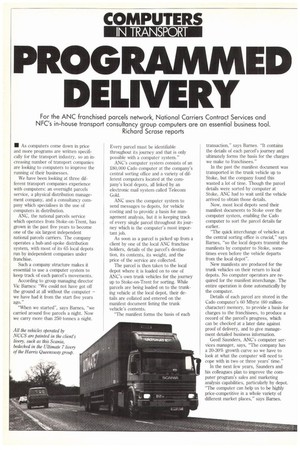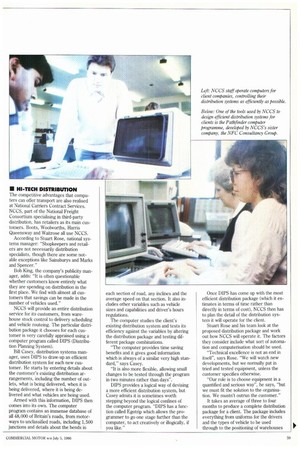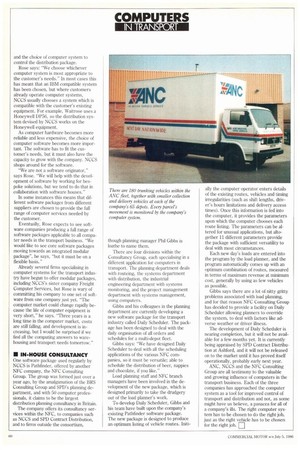PROGRAMMED DELIVERY
Page 68

Page 69

Page 70

If you've noticed an error in this article please click here to report it so we can fix it.
For the ANC franchised parcels network, National Carriers Contract Services and NFC's in-house transport consultancy group computers are an essential business tool. Richard Scrase reports
• As computers come down in price and more programs are written specifically for the transport industry, so an increasing number of transport companies are looking to computers to improve the running of their businesses, We have been looking at three different transport companies experience with computers: an overnight parcels service, a physical distribution management company, and a consultancy company which specialises in the use of computers in distribution.
ANC, the national parcels service which operates from Stoke-on-Trent, has grown in the past five years to become one of the six largest independent national parcels carriers. The company operates a hub-and-spoke distribution system, with most of its 65 local depots run by independent companies under franchise.
Such a company structure makes it essential to use a computer system to keep track of each parcel's movements.
According to group managing director Vic Barnes: "We could not have got off the ground at all without the computer — we have had it from the start five years ago."
"When we started", says Barnes, "we carried around five parcels a night. Now we carry more than 250 tonnes a night. Every parcel must be identifiable throughout its journey and that is only possible with a computer system."
ANC's computer system consists of an £80,000 Cado computer at the company's central sorting office and a variety of different computers located at the company's local depots, all linked by an electronic mail system called Telecom Gold.
ANC uses the computer system to send messages to depots, for vehicle costing and to provide a basis for management analysis, but it is keeping track of every single parcel throughout its journey which is the computer's most important job.
As soon as a parcel is picked up from a client by one of the local ANC franchise holders, details of the parcel's destination, its contents, its weight, and the price of the service are collected.
The parcel is then taken to the local depot where it is loaded on to one of ANC's own trunk vehicles for the journey up to Stoke-on-Trent for sorting. While parcels are being loaded on to the trunking vehicle at the local depot, their details are collated and entered on the manifest document listing the trunk vehicle's contents.
"The manifest forms the basis of each
transaction," says Barnes. "It contains the details of each parcel's journey and ultimately forms the basis for the charges we make to franchisees."
In the past the manifest document was transported in the trunk vehicle up to Stoke, but the company found this wasted a lot of time. Though the parcel details were sorted by computer at Stoke, ANC had to wait until the vehicle arrived to obtain those details.
Now, most local depots send their manifest documents to Stoke over the computer system, enabling the Cado computer to sort the parcel details far earlier.
"The quick interchange of vehicles at the central sorting office is crucial," says Barnes, "so the local depots transmit the manifests by computer to Stoke, sometimes even before the vehicle departs from the local depot".
New manifests are produced for the trunk vehicles on their return to local depots. No computer operators are required for the manifest interchange. The entire operation is done automatically by the computer.
Details of each parcel are stored in the Cado computer's 60 Mbyte (60 millioncharacter) memory, to provide a basis for charges to the franchisees, to produce a record of the parcel's progress, which can be checked at a later date against proof of delivery, and to give management detailed business information.
Geoff Saunders, ANC's computer services manager, says, "The company has a 20-30% growth curve so we have to look at what the computer will need to cope with in two or three years' time."
In the next few years, Saunders and his colleagues plan to improve the computer program's sales and marketing analysis capabilities, particularly by depot. "The computer can help us to be highly price-competitive in a whole variety of different market places," says Barnes.
• NI-TECH DISTRIBUTION The competitive advantages that computers can offer transport are also realised at National Carriers Contract Services. NCCS, part of the National Freight Consortium specialising in third-party distribution, has retailers as its main customers. Boots, Woolworths, Harris Queensway and Waitrose all use NCCS.
According to Stuart Rose, national systems manager: "Shopkeepers and retailers are not necessarily distribution specialists, though there are some notable exceptions like Sainsburys and Marks and Spencer," Bob King, the company's publicity manager, adds: "It is often questionable whether customers know entirely what they are spending on distribution in the first place. We find with almost all customers that savings can be made in the number of vehicles used."
NCCS will provide an entire distribution service for its customers, from warehouse stock control to delivery scheduling and vehicle routeing. The particular distribution package it chooses for each customer is very carefully appraised using a computer program called DIPS (Distribution Planning System).
Bill Casey, distribution systems manager, uses DIPS to draw-up an efficient distribution system for each new customer. He starts by entering details about the customer's existing distribution arrangements, including the number of outlets, what is being delivered, when it is being delivered, where it is being delivered and what vehicles are being used.
Armed with this information, DIPS then comes into its own. The computer program contains an immense database of all 4-8,000 of Britain's roads, from motorways to unclassified roads, including 1,500 junctions and details about the bends in each section of road, any inclines and the average speed on that section. It also includes other variables such as vehicle sizes and capabilities and driver's hours regulations.
The computer studies the client's existing distribution system and tests its efficiency against the variables by altering the distribution package and testing different package combinations.
"The computer provides time saving benefits and it gives good information which is always of a similar very high standard," says Casey.
"It is also more flexible, allowing small changes to be tested through the program in two minutes rather than days".
DIPS provides a logical way of devising a more efficient distribution system, but Casey admits it is sometimes worth stepping beyond the logical confines of the computer program. "DIPS has a function called Egotrip which allows the programmer to go one stage further than the computer, to act creatively or illogically, if you like." Once DIPS has come up with the most efficient distribution package (which it estimates in terms of time rather than directly in terms of cost), NCCS then has to plan the detail of the distribution system it will operate for the client.
Stuart Rose and his team look at the proposed distribution package and work out how NCCS will operate it. The factors they consider include what sort of automation and computerisation should be used.
"Technical excellence is not an end in itself", says Rose. "We will watch new developments, but we normally put in tried and tested equipment, unless the customer specifies otherwise.
"Our role is to choose equipment in a quantified and serious way", he says, "but we must fit the solution to the organisation. We mustn't outrun the customer."
It takes an average of three to four months to produce a complete distribution package for a client. The package includes everything from uniforms for the drivers and the types of vehicle to be used through to the positioning of warehouses and the choice of computer system to control the distribution package.
Rose says: "We choose whichever computer system is most appropriate to the customer's needs." In most cases this has meant that an IBM compatible system has been chosen, but where customers already operate computer systems, NCCS usually chooses a system which is compatible with the customer's existing equipment. For example, Waitrose uses a Honeywell I) P56. so the distribution system devised by NCCS works on the Honeywell equipment.
As computer hardware becomes more reliable and less expensive, the choice of computer software becomes more important. The software has to fit the customer's needs, but it must also have the capacity to grow with the company. NCCS shops around for the software.
"We are not a software originator," says Rose. "We will help with the development of software by working for bespoke solutions, but we tend to do that in collaboration with software houses."
In some instances this means that different software packages from different suppliers are chosen to provide the full range of computer services needed by the customer.
Eventually, Rose expects to see software companies producing a full range of software packages applicable to all computer needs in the transport business. "We would like to see core software packages moving towards an integrated modular package", he says, "but it must be on a flexible basis."
Already several firms specialising in computer systems for the transport industry have begun to offer modular packages, including NCCS's sister company Freight Computer Services, but Rose is wary of committing his company to one set of software from one company just yet. "The computer market could change rapidly because the life of computer equipment is very short," he says. "Three years is a long time in the computer market, costs are still falling, and development is increasing, but I would be surprised if we fund all the computing answers to warehousing and transport needs tomorrow."
• IN-HOUSE CONSULTANCY One software package used regularly by NCCS is Pathfinder, offered by another NFC company, the NFC Consulting Group. The group was formed just over a year ago, by the amalgamation of the BRS Consulting Group and SPD's planning department, and with 50 computer professionals, it claims to be the largest distribution planning consultancy in Britain.
The company offers its consultancy services within the NFC, to companies such as NCCS and SPD Contract Distribution, and to firms outside the consortium, though planning manager Phil Gibbs is loathe to name them.
There are four divisions within the Consultancy Group, each specialising in a different application for computers in transport. The planning department deals with routeing, the systems department with distribution, the industrial engineering department with systems monitoring, and the project management department with systems management, using computers.
Gibbs and his colleagues in the planning department are currently developing a new software package for the transport industry called Daily Scheduler. The package has been designed to deal with the daily organisation of all orders and schedules for a multi-depot fleet.
Gibbs says: "We have designed Daily Scheduler to deal with all the scheduling applications of the various NFC companies, so it must be versatile: able to schedule the distribution of beer, nappies and chocolate, if you like."
Load planning staff and NFC branch managers have been involved in the development of the new package, which is designed primarily to take the drudgery Out of the load planner's work.
To develop Daily Scheduler, Gibbs and his team have built upon the company's existing Pathfinder software package. The new package is designed to produce an optimum listing of vehicle routes. Initi ally the computer operator enters details of the existing routes, vehicles and timing irregularities (such as shift lengths, driver's hours limitations and delivery access times). Once this information is fed into the computer, it provides the parameters upon which the computer chooses each route listing. The parameters can be altered for unusual applications, but altogether 11 different parameters provide the package with sufficient versatility to deal with most circumstances.
Each new day's loads are entered into the program by the load planner, and the program automatically comes up with an optimum combination of routes, measured in terms of maximum revenue at minimum cost, generally by using as few vehicles as possible.
Gibbs says there are a lot of nitty gritty problems associated with load planning, and for that reason NFC Consulting Group has decided to provide a facility on Daily Scheduler allowing planners to override the system, to deal with factors like adverse weather or driver illness.
The development of Daily Scheduler is nearing completion, but it will not be available for a few months yet. It is currently being appraised by SPD Contract Distribution at Ashford, and it will not be released on to the market until it has proved itself operationally, probably early next year.
ANC, NCCS and the NFC Consulting Group are all testimony to the valuable and growing influence of computers in the transport business. Each of the three companies has approached the computer system as a tool for improved control of transport and distribution and not, as some might have us believe, a panacea for all of a company's ills. The right computer system has to be chosen to do the right job, just as the right vehicle has to be chosen for the right job. n




































































































